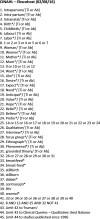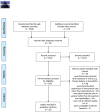What matters to women during childbirth: A systematic qualitative review
- PMID: 29664907
- PMCID: PMC5903648
- DOI: 10.1371/journal.pone.0194906
What matters to women during childbirth: A systematic qualitative review
Erratum in
-
Correction: What matters to women during childbirth: A systematic qualitative review.PLoS One. 2018 May 17;13(5):e0197791. doi: 10.1371/journal.pone.0197791. eCollection 2018. PLoS One. 2018. PMID: 29772012 Free PMC article.
Abstract
Introduction: Design and provision of good quality maternity care should incorporate what matters to childbearing women. This qualitative systematic review was undertaken to inform WHO intrapartum guidelines.
Methods: Using a pre-determined search strategy, we searched Medline, CINAHL, PsycINFO, AMED, EMBASE, LILACS, AJOL, and reference lists of eligible studies published 1996-August 2016 (updated to January 2018), reporting qualitative data on womens' childbirth beliefs, expectations, and values. Studies including specific interventions or health conditions were excluded. PRISMA guidelines were followed.
Data collection and analysis: Authors' findings were extracted, logged on a study-specific data form, and synthesised using meta-ethnographic techniques. Confidence in the quality, coherence, relevance and adequacy of data underpinning the resulting themes was assessed using GRADE-CERQual. A line of argument synthesis was developed.
Results: 35 studies (19 countries) were included in the primary search, and 2 in the update. Confidence in most results was moderate to high. What mattered to most women was a positive experience that fulfilled or exceeded their prior personal and socio-cultural beliefs and expectations. This included giving birth to a healthy baby in a clinically and psychologically safe environment with practical and emotional support from birth companions, and competent, reassuring, kind clinical staff. Most wanted a physiological labour and birth, while acknowledging that birth can be unpredictable and frightening, and that they may need to 'go with the flow'. If intervention was needed or wanted, women wanted to retain a sense of personal achievement and control through active decision-making. These values and expectations were mediated through womens' embodied (physical and psychosocial) experience of pregnancy and birth; local familial and sociocultural norms; and encounters with local maternity services and staff.
Conclusions: Most healthy childbearing women want a positive birth experience. Safety and psychosocial wellbeing are equally valued. Maternity care should be designed to fulfil or exceed womens' personal and socio-cultural beliefs and expectations.
Conflict of interest statement
Figures
References
-
- Tuncalp Were WM, MacLennan C, Oladapo OT, Gulmezoglu AM, Bahl R, et al. Quality of care for pregnant women and newborns—the WHO vision. BJOG 2015; 122:1045–49. doi: 10.1111/1471-0528.13451 - DOI - PMC - PubMed
-
- Miller S, Abalos E, Chamillard M, Ciapponi A, Colaci D, Comandé D, et al. Beyond too little, too late and too much, too soon: a pathway towards evidence-based, respectful maternity care worldwide. Lancet 2016. October 29; 388(10056):2176–92 doi: 10.1016/S0140-6736(16)31472-6 - DOI - PubMed
-
- Bohren MA, Vogel JP, Hunter EC, Lutsiv O, Makh SK, Souza JP, et al. The Mistreatment of Women during Childbirth in Health Facilities Globally: a Mixed-Methods Systematic Review. PLoS Med 2015;12:e1001847 doi: 10.1371/journal.pmed.1001847 - DOI - PMC - PubMed
-
- Freedman LP, Kruk ME. Disrespect and abuse of women in childbirth: challenging the global quality and accountability agendas. Lancet 2014; 384:e42–4 doi: 10.1016/S0140-6736(14)60859-X - DOI - PubMed
-
- Renfrew MJ, McFadden A, Bastos MH, Campbell J, Channon AA, Cheung NF, et al. Midwifery and quality care: findings from a new evidence-informed framework for maternal and newborn care. Lancet. 2014:384:1129–45 [Accessed 19th February 2018] doi: 10.1016/S0140-6736(14)60789-3 - DOI - PubMed
Publication types
MeSH terms
Grants and funding
LinkOut - more resources
Full Text Sources
Other Literature Sources
Medical



